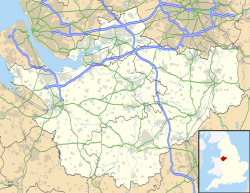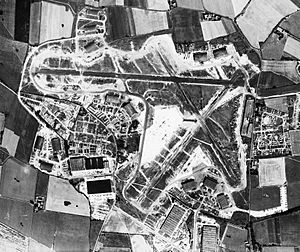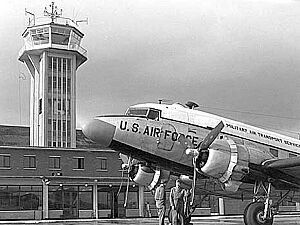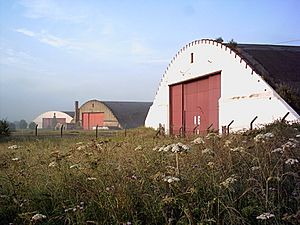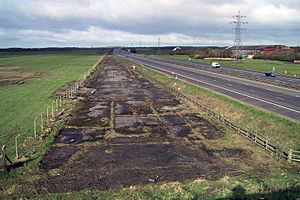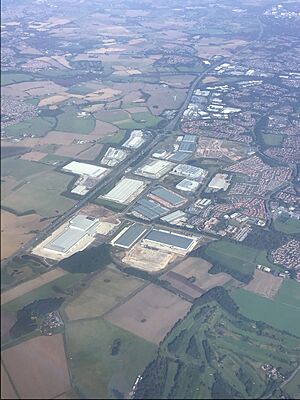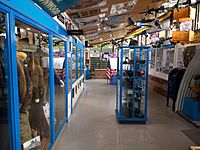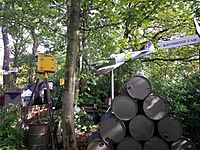RAF Burtonwood facts for kids
Quick facts for kids RAF Burtonwood
|
|||||||||||
|---|---|---|---|---|---|---|---|---|---|---|---|
| Near Warrington, Cheshire in England | |||||||||||
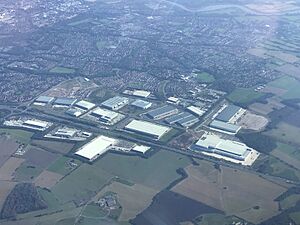
The site of RAF Burtonwood (2024)
|
|||||||||||
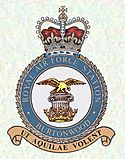
Ut aquilae volent (Latin for 'That eagles may fly')
|
|||||||||||
|
Location in Cheshire
|
|||||||||||
| Coordinates | 53°24′50″N 2°39′04″W / 53.414°N 2.651°W | ||||||||||
| Type | RAF station (US Visiting Forces) | ||||||||||
| Site information | |||||||||||
| Owner | Ministry of Defence | ||||||||||
| Operator | RAF (1940–1942, 1946–1948 & 1965–1967) US Army Air Forces (1942–1946) US Air Force (1948–1965) US Army (1967–1994) |
||||||||||
| Condition | Closed | ||||||||||
| Site history | |||||||||||
| Built | 1938–1940 | ||||||||||
| In use | 1940–1994 | ||||||||||
| Fate | Buildings demolished and site sold for redevelopment, including Omega Business Park and junction 8 of the M62 motorway. | ||||||||||
| Airfield information | |||||||||||
| Identifiers | ICAO: EGOB | ||||||||||
|
|||||||||||
RAF Burtonwood was a very important air base in Cheshire, England. It was located near Warrington. The base was first opened in 1940 by the Royal Air Force (RAF) to help with World War II. In 1942, it was given to the United States for their war efforts.
By the end of the war, about 18,000 American service members were stationed there. In 1946, the base went back to the United Kingdom, but American forces continued to use it. RAF Burtonwood officially closed in 1991. Most of its runways and buildings have since been taken down. Today, a Heritage Centre on part of the old base tells the story of the service members, the war, and the airplanes that were there.
Contents
A Look at Burtonwood's History
Burtonwood airfield started on January 1, 1940. It was a place where British aircraft were fixed and stored. The RAF's No. 37 Maintenance Unit ran it until June 1942.
American Forces During World War II
In June 1942, the base was given to the United States Army Air Forces. It became a major repair center for American planes from several different air forces. Burtonwood was also known as Base Air Depot 1 (BAD 1). Even then, the RAF Police helped keep the base secure for many years.
During WWII, Burtonwood was the largest airfield in Europe. It had the most American personnel and aircraft repair facilities. The loud sound of airplane engines being tested could be heard far away, especially at night. By the end of the war, 18,000 American service members were based at Burtonwood. Many American service members spent their free time in nearby Warrington.
After the War: United States Air Force
After the war ended, the RAF took control of Burtonwood again in June 1946. It became a storage depot.
In November 1946, six B-29 Superfortress bombers from the American Air Force came to Burtonwood. They were part of a "training deployment" to Europe. More B-29s arrived in May 1947. This training program was actually a secret way to keep a strong American air force in Europe. American personnel also used the base to maintain C-54 Skymaster planes during the Berlin Airlift.
On November 7, 1953, the American Air Force's 53rd Weather Reconnaissance Squadron started flying from Burtonwood. They used WB-29 and later WB-50D Superfortress planes. Their job was to collect weather data for forecasts. This squadron moved to RAF Alconbury in 1959.
Burtonwood was also a busy place for transporting cargo and passengers until 1958. Planes like the Douglas C-54, Douglas C-118, Douglas C-124, Douglas C-133 Cargomaster, and Lockheed C-130 flew through the base. During the 1950s, American Air Force planes based in Europe, such as F-84 Thunderjets and F-86 Sabres, were repaired or updated at Burtonwood.
A small village was built on the base for the many American service members and their families. It had its own school and shop. These buildings were called "Tobacco Houses" because the land lease was paid with American tobacco.
Most of the American Air Force's use of Burtonwood ended in April 1959 when the flight line closed. The base was then returned to the Ministry of Defence in 1965.
United States Army Use
The U.S. Department of Defense came back to Burtonwood in 1966. This happened when France decided to leave its military support for NATO. Burtonwood became a place to receive equipment and supplies that were being moved from former French NATO bases. After this, the US Army took over the base and renamed it Burtonwood Army Depot.
The Army turned Burtonwood into a large storage and supply depot. The main warehouse was said to be the biggest building under one roof in Europe. The idea was that if there was an emergency, American troops from the USA would fly to Burtonwood. They would pick up their gear there before heading to the battle front. The base also helped with the 1991 Gulf War.
When the Cold War ended, Burtonwood Army Depot was no longer needed for NATO. It officially closed in June 1994.
The Runways Today
The M62 motorway now cuts right through the old airfield. It goes over what used to be the main runway. Before a new motorway junction was built, you could still see part of this runway. Now, it's covered by Junction 8. Part of the airfield is also home to the Welcome Break Burtonwood service station. The other two runways were oriented differently.
What's Left of the Base
In late 2008 and early 2009, the last remaining buildings, including the storage bunkers, were taken down. Today, you can still see some of the old World War II aircraft parking areas and parts of the old airfield roads.
During 2016, the rest of the airfield was removed. A new industrial estate was built on the land. The main road through this new area is called Skyline Drive.
One building from the original base still stands and is in use today (as of 2025). It is the Royal Mail building, which was built before 1945.
RAF Burtonwood Heritage Centre
There is a museum and heritage center on part of the old base. You can find it at the Gulliver's World theme park in Warrington.
The center has five areas that show what life was like at Burtonwood. You can learn about the service members, the planes, entertainment, and personal stories. Some of the planes shown are the B-17 Flying Fortress, P-47 Thunderbolt, and the B-29 Super Fortress. There are also different types of Pratt & Whitney Wasp series engines on display.
See Also
- List of former Royal Air Force stations
- RNAS Stretton
 | George Robert Carruthers |
 | Patricia Bath |
 | Jan Ernst Matzeliger |
 | Alexander Miles |




